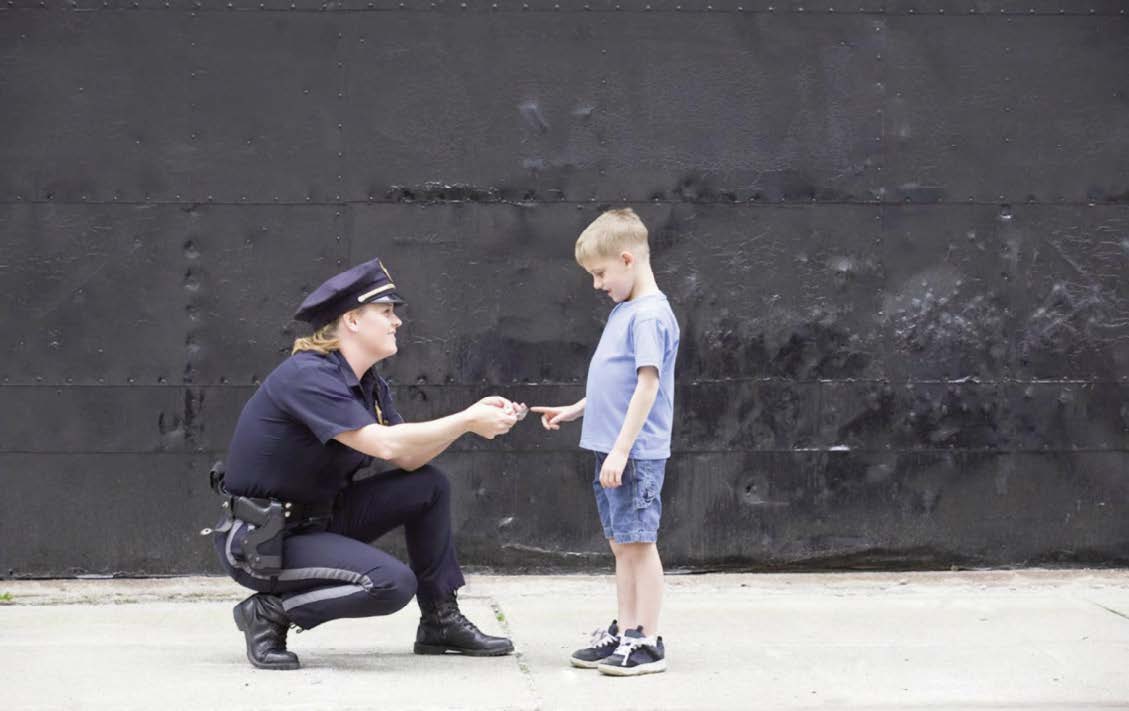AMERICAN ACADEMY OF DEVELOPMENTAL MEDICINE & DENTISTRY
AUTISM AWARENESS MONTH
"Understanding is a lot like sex. It's got a practical purpose, But that's not why people do it normally."
BY H. BARRY WALDMAN, DDS, MPH, PHD, STEVEN P. PERLMAN, DDS, MSCD, DHL (HON) AND JEFFREY SEIVER, DDS
The major newspaper for Long Island, New York, Newsday, recently had a full two-page article describing the misunderstandings between the police and individuals with disabilities.
"The repetitive movements. The lack of eye contact or failure to respond to simple questions. Outbursts that can become physical. For millions of families with loved ones on the autism spectrum, the behavior is all too familiar.
But through the eyes of a police officer or first responder, the signs can be confusing – or potentially threatening."2
New York State, moving to address that communication gap, has begun issuing ID cards for people with intellectual or developmental disabilities that can be presented to law enforcement, firefighters and emergency services personnel to prevent these encounters from becoming dangerous for all involved (please see Figure 1, next page). 2
The card, which is free and voluntary for all families, contains standard information about a person – name, address, date of birth and emergency contact and a disclaimer that the holder may have difficulty understanding and following directions, or may become unable to respond. "I may become physically agitated if you prompt me verbally or touch me or move too close to me."
The back of the card can be personalized to a person with unique challenges. For example, it could give an instruction to law enforcement not to make sudden movements, to speak in a calm and reassuring voice or to shut off a police siren to avoid sensory overload.
Unlike individuals with Down syndrome or cerebral palsy, who are immediately distinguished based on physical characteristics, people with autism often look like an individual without intellectual developmental disorder. But their behavior can sometime appear erratic, often if a routine is upset and it can manifest itself in a multitude of ways. For example, many autistic people manage bouts of anxiety in stressful situations by repeating a phrase or motion, such as rocking back and forth or spinning. 2
• A law enforcements officer could think the person is intoxicated or intentionally ignoring their instruction.
• The police department now requires 26 hours of mandatory mental health and disability training for new recruits, including a focus on autism awareness.
• Police officers are trained to look for nuance signs that someone may have a developmental disability, such as lack of eye contact or repetitive behavior.
For example: "When interacting with a person with autism:
• Be patient and give the person space. • Use simple and concrete sentences. • Give plenty of time for the person to process and respond. • Be alert to signs of increased frustration and try to eliminate the source if possible as behavior may escalate. • Avoid quick movements and loud noises. • Do not touch the person unless absolutely necessary. • Use information from caregiver, if available, on how to best respond." 3
The State of Illinois issues a comparable card as proof of disability. The card may contain medical information that could be helpful in emergency care. Five types of disabilities are specified:
• Physical: A permanent physical loss, impairment, or disease, which significantly limits physical ability or motor skills
• Developmental: A disability that is because of:
■ An intellectual disability, cerebral palsy, epilepsy, or autism; or
■ An intellectual disability, cerebral palsy, epilepsy, or autism; or Any other condition that results in impairment similar to that caused by an intellectual disability.
• Visual: Blindness
• Hearing: A disability that results in complete absence of hearing.
• Mental: A significant impairment of an individual's cognitive, effective, or relational abilities. 4
INTERACTION WITH LAW ENFORCEMENT OFFICERS
Federal data show that people with disabilities are likely to interact, at some point with first responders to varying incidents. "…the FBI Law Enforcement Bulletin found in 2001 that people with disabilities, including autism, have up to seven times more contact with law enforcement offi cers than other members of the population." 2

PATIENCE PLEASE: The behavior of a person with autism can sometime appear erratic, especially if a routine is upset, and it can manifest itself in a multitude of ways. When interacting with a person with autism, be patient and give the person space, and give plenty of time for the person to process and respond.
In particular, individuals with Asperger's syndrome (a mild form of high-functioning autism more common in males than in females) are over-represented in forensic criminal settings. "Unique features of such persons may heighten their risks for engaging in criminal behavior, including: a predilection for intense narrow interests, when coupled with deficient social awareness of salient interpersonal and social constraints on behavior, can result in criminal acts… these disorders appear to have a biological underpinning for deficits in understanding… a finding that may have important repercussions when assessing remorse in criminal proceedings." 5
ONE OUTCOME
"People with disabilities are just like us. They have dreams and other things just like us." – As said by a 4th-Grade Student at the Birch Meadow Elementary School in Reading, MA, and recorded by Understanding Disabilities Inc. Visit understandingdisabilities.org to learn more.

NO GUARANTEES: When dealing with individuals with developmental disabilities, law enforcement officers may be advised to not to make sudden movements, to speak in a calm and reassuring voice or to shut off a police siren to avoid sensory overload.
ABOUT THE AUTHORS: H. Barry Waldman, DDS, MPH, PhD is a SUNY Distinguished Teaching Professor, Department of General Dentistry, Stony Brook University, NY. E-mail: h.waldman@stonybrook.edu Steven P. Perlman, DDS, MScD, DHL (Hon) is the Global Clinical Director and founder, Special Olympics, Special Smiles and Clinical Professor of Pediatric Dentistry, The Boston University Goldman School of Dental Medicine. Jeffrey Seiver, DDS is Clinical Assistant Professor, Department of General Dentistry, Stony Brook University, NY.
References 1. Oppenheimer N. Quotes. Available from: goodreads.com/quotes/497743-understanding-is-a-lot- like-sex-it-s-got-a-practical Accessed March 11, 2019. 2. Brodsky R. New ID cards may help those with disabilities. Newsday A20-21, March 10, 2019. 3. Autism Speaks. Search and Rescue. Available from: autismspeaks.org/search-and-rescue Accessed March 12, 2019. 4. Illinois Legal Aid on Line. ID card for people with disabilities. Available from: illinoislegalaid.org/legal-information/id- cards-people-disabilities Accessed March 12, 2019. 5. Haskins BG, Silva JA. Asperger's Disorder and criminal behavior: forensic-psychiatric considerations. Journal American Academy of Psychiatric Law, 2006; 34:374-384.
UNDERSTANDING DISABILITIES (NORMALLY, PEOPLE DO NOT) : SOME SOURCES OF INFORMATION
UNDERSTANDING DISABILITIES Offers a comprehensive K-8 disability awareness curriculum that helps build school cultures and student interactions based on a foundation of mutual respect and understanding. Stronger interpersonal relationships, healthier school climates, improved student well-being, and higher rates of academic excellence are only some of the measurable and quantifiable outcomes of our innovative program. Available from: understandingdisabilities.org/our-curriculum
SPECIAL OLyMPICS UNIFIED CHAMPION SCHOOLS The mini-lessons on understanding disabilities can be used as part of schoolwide instructional lessons to assist with developing attitudes and behaviors that are respectful toward all students, regardless of ability. Available from: media.specialolympics.org/resources/community-building/youth-and-school/uni- fied-champion-schools/Mini-Lesson-Understanding-Disability.pdf
IRIS CENTER Offers a wide variety of free, online resources about evidencebased instructional and intervention practices, including modules, practice guides and research summaries developed in collaboration with nationally-recognized researchers and education experts, to support the education of all children, particularly those with disabilities. Available from: iris.peabody.vanderbilt.edu
NATIONAL CENTER ON ACCESSIBLE EDUCATIONAL MATERIALS FOR LEARNING Provides resources addressing eligibility and services to ensure equitable opportunities for children with disabilities. Available from: ccrs.osepideasthatwork.org/teachers-social-emotional-behavior understanding-disabilities